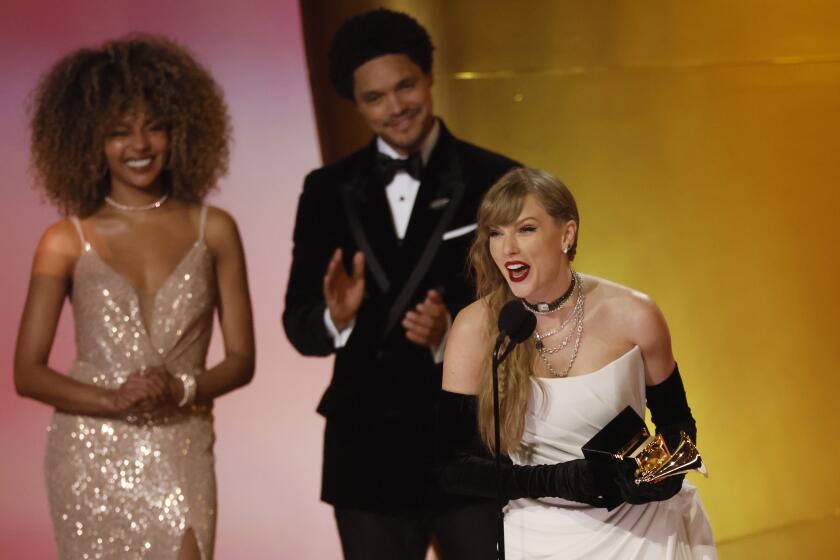Los Angeles Film Festival: Art-house fare shares a forum with blockbusters.
RODENT lovers and rat rights activists, consider yourselves warned.
In the surrealistically violent action blockbuster “Wanted” -- which premieres at the Los Angeles Film Festival on Thursday and arrives in theaters June 27 -- several thousand rats are turned into four-legged weapons of mass destruction. Laden with explosives, they’re let loose in a fortress-like textile mill with the intended purpose of maiming and killing as many people as possible in the bloody buildup to the film’s climactic set-piece. Needless to say, the results aren’t pretty.
Based on Mark Millar’s graphic novel series of the same name, “Wanted” stars Scottish actor James McAvoy as a cubicle-bound, windbreaker-wearing accountant who discovers the blood of a killer runs through his veins. (Blame heredity: His father was the Michael Jordan of assassins.) Morgan Freeman appears as the head of a secret society of hit men called “the Fraternity,” and Angelina Jolie plays a tough-as-Kevlar hit woman who schools McAvoy’s character in the ways of the warrior (which in his case involve getting repeatedly sliced by butcher knives, punched with brass knuckles and learning to curve the trajectory of bullets so they swerve around stationary objects).
It’s a film fixated with surfaces -- fiery sunsets, shattered glass, open wounds -- and packed with visceral images that fairly leap off the screen: arterial spray, spent shell casings and exploding rodents chief among them. But also in ways both profound and ridiculous, “Wanted” is the ideal film to open the LAFF (co-sponsored by The Times).
A determinedly populist “festival of discovery,” the Westwood-based fest’s tag line asserts: “The audience is king.” It has long been dedicated to celebrating film in all its forms. But unlike other North American festivals, such as the Sundance Film Festival in Utah, New York’s Tribeca Film Festival and the Toronto Film Festival -- which still command greater name brand cachet with cinéastes and acquisitions executives -- Los Angeles’ cultural identity as home of the movie industry has been something of a historical liability for the LAFF.
In a town where movies premiere almost every night of the week, the local economy rises and falls on film production schedules, and the array of independent and international movies in theaters in a given week is nearly unrivaled, the paradox is this: How do you get locals excited about their hometown film fest?
However, thanks to the flashy counterprogramming step of including popcorn movies and big-budget studio fare like the closing-night selection “Hellboy II: The Golden Army” (a comic book adaptation from Oscar-nominated writer-director Guillermo del Toro) and “Wanted,” the 10-day festival’s stature has grown in recent years. And so has attendance, which is up almost threefold, from around 30,000 in 2005 to 83,000 last year, with expected gate totals in excess of 100,000 in 2008, organizers said.
“We are a film festival, but don’t think of us like other film festivals,” LAFF director Richard Raddon said. “We’ve never been opposed to screening big studio movies as long as we had the right context for them. We’re open to thinking outside the box.”
Added fest director of programming Rachel Rosen: “The festival has to be right for the city it’s in. We’re a film fest in L.A. in the summer. To pretend that we’re not seems ridiculous.”
With that in mind, consider the pedigree of “Wanted” director Timur Bekmambetov. His Russian-made fantasy-action hit “Nochnoi Dozor” (Night Watch) screened as part of the LAFF in 2005. And that same year, the Kazakh-born TV and music video auteur was cherry-picked by Universal to direct “Wanted,” his first Hollywood blockbuster.
“I have a very specific relationship with film festivals: They don’t like me,” Bekmambetov said. “In general, my films aren’t in competition. I feel very proud to be part of this.”
The director also admitted some shock that Universal gave him enough free reign to make what’s essentially an art-house action movie on steroids -- a darker, quirkier, more violent and more ironic film than any summer tentpole in recent memory. “I don’t understand and can’t explain why the studio supported our creative ambitions,” Bekmambetov said. “It was very surprising that I had the chance to do whatever I wanted. I think we witchcrafted them.”
Which, when considered a certain way, is a microcosm of what’s on offer at the LAFF: a synergistic mash-up of art for art’s sake, bottom line-boosting commercial product and the kind of indie movie alchemy that could come out of only one dream factory -- Hollywood.
Transforming moment
ALTHOUGH IT’S easy to overlook the fact that the festival’s identity is very much a work in progress, what is generally regarded as the LAFF’s watershed moment took place last June when four theaters in Westwood Village simultaneously premiered Michael Bay’s sci-fi blockbuster “Transformers.” The event nature of the screening was capped off by a massive premiere party that closed several blocks of Broxton Avenue and featured animatronic robots, free booze and a singular co-mingling of celebrities and hoi polloi.
Hard to imagine the equivalent thing at, say, the Telluride Film Festival in Colorado. But the programming move broadened perceptions about what the LAFF is -- and more important in terms of studio relationships, about how mainstream it’s willing to be.
“The general public never gets these opportunities -- they never go to premieres,” Raddon explained. “We made the experience of a big Hollywood premiere accessible. For $25, you go see the movie and go to the party. The idea being if this isn’t what you like, maybe the Chinese documentary down the street is. But the people that came out had a great time.”
Which isn’t to say that the majority of the LAFF’s 230-plus feature films, shorts and music videos all aim for Michael Bay-esque mass appeal. (Which would be nigh impossible anyway for movies such as the minutely observed geektastic comedy-romance “HottieBoombaLottie,” the real-life “Spinal Tap” tale of the heavy metal band Anvil in “Anvil! The Story of Anvil” or the in-your-face Angeleno artist documentary “Dirty Hands: The Art & Crimes of David Choe.”) The operational idea, organizers say, is to run the festival as “a big celebration of movies” covering the cinematic spread by appealing as much to ravenous cinephiles as popcorn movie fans drawn out by next Sunday’s screening of the family sci-fi adventure “Journey to the Center of the Earth” in 3-D.
But just as important in a town where connections are everything and finding the Next Big Thing is a primary directive, festival programmers vet international movies (such as the intense Mexican drama “Where Are Their Stories?” or the Swedish apocalypse comedy “You, the Living”) with an eye toward discovering crossover filmmakers like Del Toro (“Pan’s Labyrinth,” “Hellboy”) and Christopher Nolan (“Memento,” “Batman Begins”) who have demonstrated a capacity for connecting with both the art house and the multiplex.
“If you wanted to be ahead of the curve and find the next Guillermo or Timur, you’d go see these films,” said Raddon. “We’re trying to promote that fact to agents: You will get clients out of this festival. During the day, we set up meetings between filmmakers and agents, managers, publicists, distributors and executives at production companies. We cover the whole spectrum of the biz and are trying to discover new talent.”
Just ask “Wanted” producer Marc Platt. As he points out, Bekmambetov’s ascendance from relative obscurity (circa ’05 when “Night Watch” played in competition at the LAFF) to hired gun for Hollywood serves as testimony to the festival’s effectiveness as a launching pad. “It speaks to the quality of the film festival in terms of having a good eye,” he said. “That’s how festivals grow in stature. You have that eye, you premiere films and their directors eventually get discovered.”
Swear like Tony Montana
BUT IN an already crowded landscape that sees new film fests cropping up like kudzu, establishing a clear identity and vying for market share with the likes of South by Southwest or even Cannes hasn’t been easy for the LAFF -- and not nearly as seamless as its Hollywood pedigree might suggest.
“It’s a crowded pack,” Raddon said. “The reality is we do want to distinguish ourselves.”
Hence the “Swear-A-Long Scarface” screening at the Ford Amphitheatre on Friday, where audience participation takes on a whole new meaning. The Ford’s al fresco crowd is encouraged to curse in time with Al Pacino’s coked-out Miami drug lord character who drops no fewer than 226 F-bombs over the course of Brian De Palma’s 1983 crime classic “Scarface.”
Even without all the bells and whistles, filmmakers are hungry to be part of the LAFF.
By her own reckoning, Academy Award-nominated writer-director Nanette Burstein’s coming of age documentary “American Teen” has already screened at more than 20 festivals, including Sundance, where it was acquired for distribution by Paramount Vantage.
Still, the director feels its inclusion in the LAFF (the movie is being screened Wednesday at the Ford Amphitheatre in Hollywood) will play a crucial part in raising its audience awareness.
“Being a part of the Los Angeles Film Festival is kind of a big deal,” Burstein said. “It’s near our time of release, it’s the first time the film has screened in L.A., the mecca of the film industry. And there’s only a handful of festivals where you can launch a film as far as distributors and press are concerned. A lot of films have their birth here.”
To hear it from Bekmambetov, however, “Wanted’s” festival premiere is cause for contentment but not unmitigated joy; for him, it’s less about the “celebration of movies” than maximizing the broadest promotional platform available for his film.
“I just expect it will be quite loud, and people around the world will hear this loud event,” he said in halting, Russian-inflected English. “It will help us to promote and release the movie here. Nothing more, nothing less.”
For more information about the festival, go to www.lafilmfest.com.
More to Read
The biggest entertainment stories
Get our big stories about Hollywood, film, television, music, arts, culture and more right in your inbox as soon as they publish.
You may occasionally receive promotional content from the Los Angeles Times.











